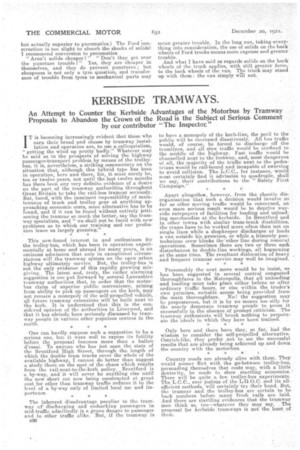KERBSIDE TRAMWAYS.
Page 28

If you've noticed an error in this article please click here to report it so we can fix it.
An Attempt to Counter the Kerbside Advantages of the Motorbus by Tramway Proposals to Abandon the Crown of the Road is the Subject of Serious Comment by our contributor "The Inspector "
IT is becoming increasingly evident that those who earn their bread and cheese by tramway installation and operation are, to use a colloquialism, "getting the wind up pretty badly." Whatever may
be said as to the prospects of solving the highway passenger-transport problem by means of the trolley. i bus, it s, nevertheless, a striking commentary on the situation that, although this hybrid type has been in operation, here and there, for, it must surely be, ten or twelve years, not until the last twelve months has there been any very definite evidence of a desire on the part of the tramway authorities throughout Great Britain to-take the rail-less tramcar seriously. But, faced, with the imminent impossibility of maintenance of track and trolley gear at anything approaching economic costs, sonic alternative has to be found, and if it can be found without entirely jettisoning the tramcar so much the better, say the tramway specialists, and "we shall not he faced with new problems as to which our training and our profession leave us largely guessing."
This new-found interest in and enthusiasm for the trolley-bus, which has been in operation experimentally at home and abroad for many years, is an ominous admission that only in exceptional circumstances will the tramway system on the open urban highway ultimately survive. But, the trolley-bus is not the only evidence of this rapidly growing misgiving. The latest and, truly' the rather alarming suggestion is one put forward by several Lancashire tramway authorities that, in order that the motorbus claim of superior public convenience, arising fiora ability to pick up passengers on the kerb, may not remain a monopoly of the self-propelled vehicle, all future tramway extensions will be built next to the kerb. It is understood that this is the considered opinion of the authorities in Liverpool, and that it has already been seriously discossed by tramway people in various other populous centres in the north.
One can hardly suppose such a suggestion to be a serious one, but it were well to expose its futility before the proposal becomes more than a ballon ()Vessel. To anyone who has not seen the state of the l3rentford High Street, through the length of which the double tram tracks cover the whole of the available highway, I cannot do better than suggest a study there on the spot of the chaos which results from the rail-next-to-the-kerb policy. Bre,ntford is a by-way, and it will never be anything else until the new short cut. now being constructed at great cost for other than tramway traffic reduces it to the level of a by-way only of limited local use and importance.
The inherent disadvantage peculiar to the tramway cfdischarging and embarking passengers in mid-traffic admittedly is a grave danger to passenger and to other traffic alike. But, if the tramway is
3330 to have a monopoly of the kerb-line, the peril to the public will be increased disastrously. All bus traffic would, of course, be forced to discharge off the tramlines, and all slow traffic would be confined to the middle of the highway. Fast traffic would be channelled next to the footway, and, most dangerous of all, the majority of the traffic next to the pedestrians would be rail-bound and incapable of swerving to avoid collision. The L.C.C., for instance, would most certainly find it advisable to quadruple, shall we say, their contributions to the " Safety First Campaign."
Apart altogether, however, from the chaotic disorganization that such a decision would involve so far as other moving traffic would be concerned, an even more serious result would be to deprive wayside ratepayers of facilities for loading and unloading merchandise at the kerbside. In Brentford and in other towns with similar tram-track disabilities, the trams have to be worked more often than not on single lines while a shopkeeper discharges or loads a van outside his premises, or while a leisurely pantechnicon crew blocks thc other line during removal operations. Sometimesthere are two or three such disturbances to double-line workings, all happening at the same time. The resultant dislocation of heavy and frequent tramcar service may well be imagined.
Presumably the next move would be to insist, as has been suggested in several central congested thoroughfares in the Metropolis, that all unloading and loading must take place either before or after ordinary traffic hours, or else within the trader's own premises, suitable access being provided from the main thoroughfare. No the suggestion may be preposterous, but it is by no means too silly for the nearly desperate tramway people to press it successfully in the absence of prompt criticism. The tramway enthusiasts will brook nothing to perpetuate the ideals in which they have been trained.
Only here and there have they, so far, had the wisdom to consider the self-propelled alternative. Ostrich-like, they prefer not to see the successful results that are already being achieved up and down the country with the motorbus.
Country roads are already alive with them. They would sooner flirt with the go-between trolley-bus, persuading themselves that costs may, with a little dexterity, be made to show startling economies. -• There will be quite a few trolley-bus experiments. The L.C.C., ever jealous of the L.G.O.C. and its allefficient methods, will certainly try their hand. But, the tramcar and the trolley-bus are certain to be back numbers before many fresh rails are laid. And there are startling evidences that the tramway men think so, too—whatever they may say. . The proposal for kerbside tramways is not the least, of them.
































